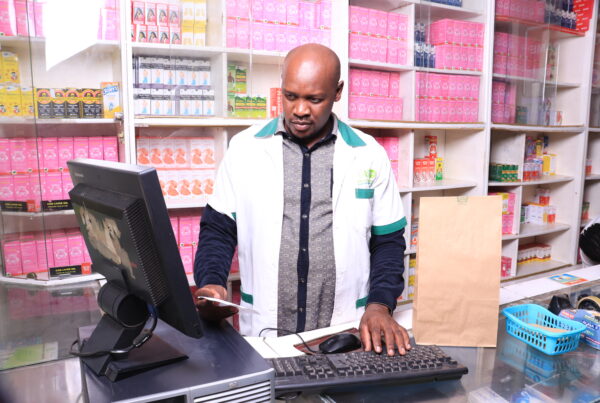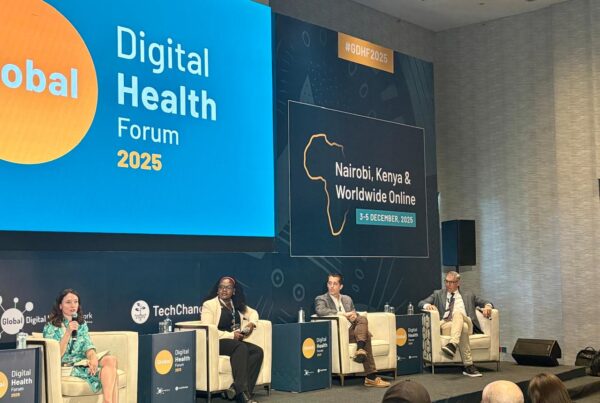The first half of 2025 has been a period of transformational progress for HealthTech Hub Africa (HTHA). We have successfully expanded our regional footprint, strengthened government partnerships, and accelerated some of Africa’s most promising healthtech startups, creating powerful momentum for the digital health sector.
This energy was palpable during our Q2 Mid-Year Webinar on July 24, where we brought together innovators, policymakers, investors, and ecosystem partners for a dynamic check-in on our shared mission. As moderator Agnes Ngure from Jhpiego reminded us, our purpose is simple yet powerful: “To connect, reflect, and co-create the next chapter of Africa’s digital health story together”.
Startups Rising Cohort Achievements & Impact
At the heart of HTHA’s work is our accelerator program, which is currently at its midpoint for the 2025 cohort. Esther Wanjiru from Villgro Africa walked us through how tailored mentorship, technical assistance, and curated peer learning are enabling startups to sharpen their value propositions and scale with confidence.
The program has welcomed a diverse cohort of 20 companies from various African nations, each selected for its innovative potential in addressing critical health challenges. These startups have engaged in expert masterclasses and fireside chats led by industry leaders, investors, and experienced founders, specifically targeting growth challenges faced by early-stage companies. One mentor highlighted a “clear evolution in product thinking and user clarity” observed within just one month of engagement.
This swift adaptability is evidenced by the remarkable progress across the cohort. Several companies have achieved significant milestones since joining the program, including:
Chefaa: A company from Egypt is currently in the process of raising a $6 million priced round.
Dynasoft: The company, based in Rwanda, has secured partnerships with the Rwanda Health Informatics Alliance. The CEO, Festus Hirwa, noted that the program has helped them make their product ready for investment and connected them with valuable networking opportunities. He also highlighted the benefit of having access to a co-working space in Kigali.
Zendawa: Just closed a partnership with Mysha Meds to supply medication to over 1,600 pharmacies.
Ultrateb: Won the Africa Impact Initiative demo.
These outcomes not only illustrate the success of the accelerator program but also emphasize HTHA’s vital role in fostering an environment where innovation can thrive.
Ecosystem at Work Policy, Partnerships & Regional Presence
Our ecosystem engagements have never been stronger. HTHA’s Intergovernmental Working Group (IWG) now counts 19 African countries as members, having on-boarded six new nations in the first half of 2025: Togo, Egypt, Chad, South Africa, Tanzania, and Zimbabwe. This platform ensures that innovation experiences inform policy discussions, recently featuring Nigerian startups Helium Health and Emergency Response Africa as case studies in high-level dialogues at the Africa Digital Health Summit.
The Hub is also actively involved in government collaborations, offering technical support. For instance, HTHA is working closely with the Ministry of Health in Uganda and its Department of Health Promotion to disseminate digital health guidelines across the country and the region. The HealthTech Policy Summit in Ethiopia showcased these efforts, with the Ministry of Health in Nigeria showcasing its recently developed EHR standards and the Ministry of Health in Ethiopia showcasing its newly inaugurated innovation lab.
At the Africa Digital Health Summit in Lagos, we convened governments, investors, and innovators to tackle scaling barriers. Calls for streamlined licensing, better data governance, and increased domestic investment resonated strongly among participants. Our inaugural regional startup meetup in Lagos unveiled the power of local peer-driven exchanges; founders shared lessons learned, identified partnership opportunities, and strengthened their national networks, a model set to expand into Nairobi and Kigali soon.
April’s Women in HealthTech Forum emphasized that women founders, investors, and policymakers are pivotal in shaping Africa’s healthtech future. A landmark moment occurred when HTHA was formally integrated into Rwanda’s National Digital Health Technical Working Group. As Immanuel Momanyi, HTHA Hub Director, put it: “This is a big milestone for us; it means we can directly help shape policies that unlock real system change.”












